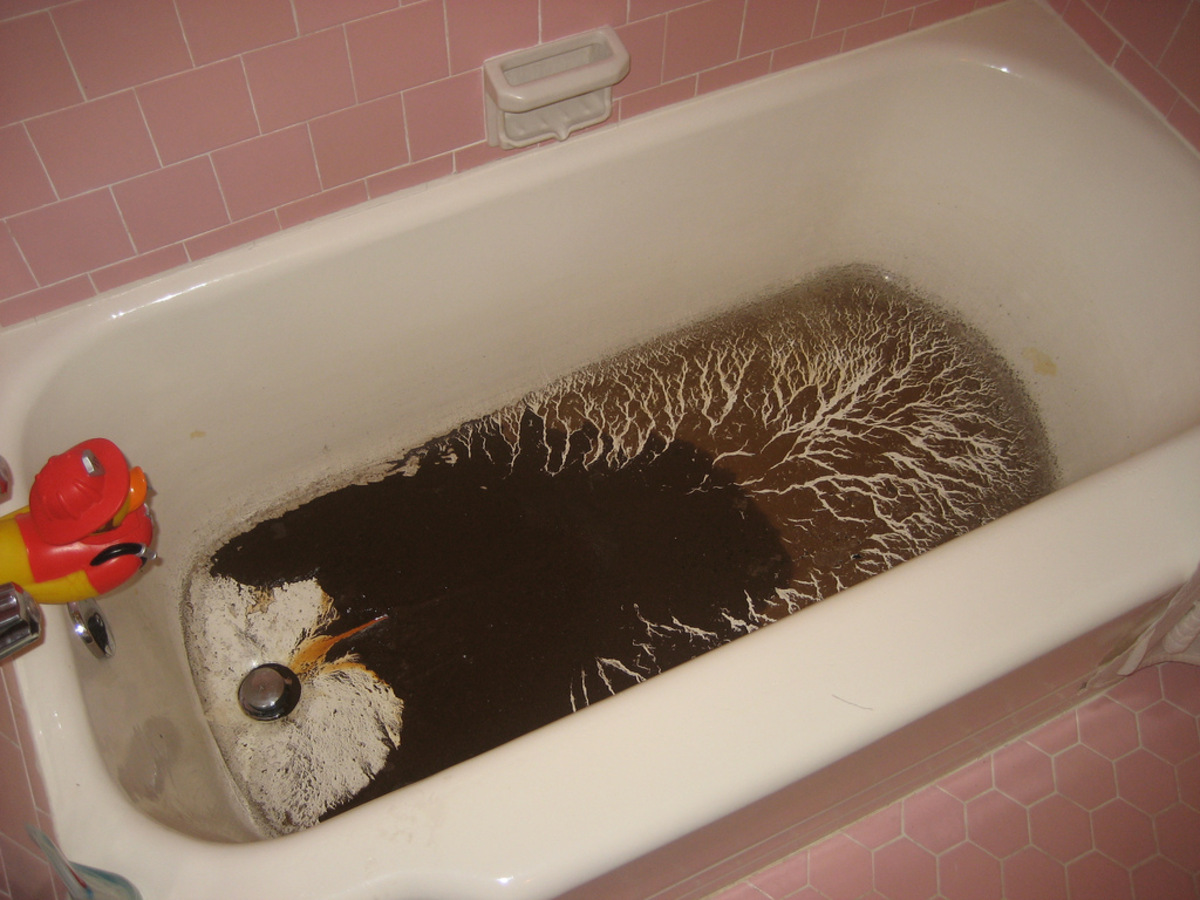An Definitive Answer: Effluent Coming Up Through the Bathtub
An Definitive Answer: Effluent Coming Up Through the Bathtub
Blog Article
What are your opinions about Why is There Sewage Coming Up Through the Bathtub?

Sewer back-up in the tub can be an upsetting and unhygienic issue for any home owner. Not only is it inconvenient, however it additionally poses significant wellness dangers and shows underlying issues with the plumbing system. Understanding why sewer is turning up with the bath tub is vital for taking appropriate activity to resolve the problem effectively.
Introduction to the Issue
Common Factors for Sewer Back-up
Obstructions in the Drain Line
Among one of the most usual sources of sewage back-up is an obstruction in the sewer line. This can occur because of the accumulation of debris, grease, or foreign things in the pipes, preventing appropriate flow and causing sewer to back up right into your bathtub.
Tree Origin Breach
Tree roots seeking dampness and nutrients can penetrate drain lines through small fractures or joints. In time, these origins can grow and increase, triggering substantial damage to the pipes and leading to sewage backup issues.
Comprehending the Problem
When sewer starts backing up into the bath tub, it's a clear sign of an issue with the drain system. The wastewater that should be streaming away from your home is rather discovering its way back into your living space, which can result in substantial damages and health hazards.
Prospective Reasons
Numerous factors can contribute to sewer back-up in the tub. From blockages in the sewage system line to concerns with the plumbing facilities, identifying the root cause is important for locating an option.
Aging Framework
Older homes might have dated plumbing systems that are more at risk to corrosion, cracks, and wear and tear. As pipes age, they become more prone to leaks and clogs, boosting the possibility of sewer backup cases.
Heavy Rainfall or Flooding
During periods of heavy rainfall or flooding, the sewer system may come to be overwhelmed with excess water, creating backups and overflows. This can cause sewer backing up right into bath tubs and various other fixtures inside the home.
Indications of Sewer Backup
Foul Odors
Undesirable odors emanating from drains pipes or fixtures, particularly in the bathroom, might suggest sewage backup problems. These odors are typically strong and consistent, indicating a trouble that calls for immediate attention.
Slow Draining Fixtures
Bathtubs, sinks, and bathrooms that drain pipes gradually or not whatsoever could be experiencing sewage back-up. If numerous fixtures are influenced all at once, it's likely that the concern stems from a typical point, such as the main sewage system line.
Gurgling Noises
Unusual gurgling or gurgling noises coming from drains pipes when water is running elsewhere in your house are a sign of air entraped in the plumbing system. This air accumulation can arise from sewage backup and need to be checked out without delay.
Health And Wellness Threats Associated with Sewer Back-up
Contamination of Water
Sewage backup can pollute the supply of water in your house, positioning a significant health and wellness danger to you and your family members. Direct exposure to polluted water can cause stomach issues, skin infections, and other illnesses.
Mold Growth
Wetness from sewage back-up can produce excellent problems for mold development in your home. Mold and mildew spores can exacerbate respiratory system troubles and trigger allergic reactions in sensitive people, making punctual cleaning essential.
Spread of Disease
Sewer includes dangerous germs, infections, and parasites that can cause a range of diseases, consisting of hepatitis, cholera, and gastroenteritis. Coming into contact with sewer or contaminated surface areas places you in danger of infection.
Tidying up After Sewage Backup
Disinfection Procedures
Completely sanitize and disinfect influenced areas after sewage backup to get rid of damaging bacteria and avoid mold growth. Use ideal cleaning products and protective equipment to ensure safe and efficient cleaning.
Reconstruction of Impacted Locations
Fix any damage to flooring, walls, or fixtures triggered by sewer backup. Depending on the level of the damage, you might require to change carpets, drywall, or other materials to restore your home to its pre-loss problem.
Immediate Actions to Take
Turning Off Water
In case of sewer back-up, it's important to switch off the supply of water to stop additional contamination and damage. Situate the main water shutoff valve in your home and shut it off up until the problem can be solved.
Calling a Professional Plumber
Taking care of sewer back-up is not a DIY work. Contact an accredited plumber with experience in taking care of sewage-related problems to examine the situation and perform essential fixings or cleanings.
Staying Clear Of Contact with Polluted Water
Until the sewer back-up is solved, prevent contact with infected water to stop the spread of bacteria and virus. Wear protective gear if you should be in the affected area and wash your hands extensively afterward.
Safety nets
Normal Maintenance of Sewer Lines
Schedule normal inspections and upkeep of your drain lines to determine and deal with potential concerns prior to they intensify right into significant troubles. This can consist of cleaning out particles, evaluating for tree root intrusion, and fixing any damaged pipelines.
Mounting Backwater Shutoffs
Think about setting up backwater valves in your plumbing system to stop sewer from receding right into your home throughout durations of heavy rainfall or flooding. These valves immediately close when water starts backing up, shielding your home from contamination.
Proper Disposal of Household Waste
Avoid purging anything aside from toilet paper and human waste down the toilet to stop obstructions and blockages in the sewage system line. Dispose of grease, oil, and various other house chemicals correctly to decrease the risk of plumbing troubles.
Why is There Sewage Coming Up Through the Bathtub
Sewage in your bathtub is a major problem that can make you want to abandon the bathroom for good. You don’t have to. However, it is important to identify the source of the issue and take the necessary steps to resolve it in order to avoid any health risks and property damage. In this article, we will discuss what could be causing sewage to back up through your bathtub so you can take action quickly and effectively.
The Main Reason For Sewage Backup in The Bathtub
All the sinks and toilets in your home connect to different pipes that lead to the main sewer line. The sewer line then connects to the municipal sewer system. This connection works seamlessly on a daily basis, but there can sometimes be a problem with the main sewer line.
The most common cause of sewage backup is a clogged or blocked main sewer line. The main sewer line can be clogged due to the accumulation of debris, tree roots or grease buildup, or other materials. Another possible cause is a collapsed pipe. When this happens, your toilets and sinks won’t be able to drain properly. This is when sewage starts backing up through the bathtub. If the problem has been occurring for some time now, it might be time to consult with a plumber as there may be more severe damage that needs fixing.
How Can You Tell if it’s Coming From Your Sewer Line?
If you’re experiencing a sewage backup in your bathtub, then you can use a few simple methods to determine if it is coming from the main sewer line. First, try to unclog the tub drain with a plunger or an auger and see if that helps. If not, then inspect all of the drains in your house and check if there is any blockage in them. If some of the other drains are not working fine, then it’s likely the problem is with your main sewer line.
Common Signs of a Clogged Main Sewer Line
If you suspect that your main sewer line is blocked, then there are a few common signs to look out for. Frequent clogs in your home are a sure sign of a clogged sewer line. You can also check for slow drainage from all the plumbing fixtures.
Slow Drains
If you notice that it takes longer for your sinks and toilets to drain, then this could be a sign of a clogged main sewer line.
Frequent Clogs
Another common sign is that your drains or toilets become clogged almost all of the time. If this happens, then it could be a sign that the main sewer line is blocked.
Water Backup
Do you notice water or sewage coming back up from any of the drains in your home? If your answer is yes, you may have a clogged main sewer line.
Sinkholes
If you’ve noticed sinkholes in your yard or overflowing sewage from the ground, you may be facing a blocked sewer line issue.
Your Shower or Sink Makes Gurgling Noises
Have you noticed gurgling noises coming from your sink or shower lately? These are typically signs of a blocked sewer line and should be checked out immediately.
How to Prevent a Main Sewer Line Clog
Once you’ve identified that your main sewer line is clogged, it’s important to take steps to prevent it from happening again. The best way to do this is to avoid putting any solid material that can clog the drain, such as grease and other debris. You should also be mindful of what you flush down your toilet. In addition, you should schedule regular maintenance for your main sewer line. This will help keep it clear and free from clogs or backups.
What Should You do if You Notice Sewage Backing up Through The Bathtub?
If you’ve noticed sewage backing up through the bathtub, then it is important to call a professional plumber immediately. A plumber can inspect the situation and determine what the cause is, such as a blocked main sewer line. They will also be able to advise you on how best to fix the issue. In some cases, a simple drain cleaning may be all that is needed.
However, if the blockage is severe, then your plumber may need to use more advanced methods to clear the blockage.
No matter what, it is important to always call a professional plumber if you experience any kind of sewage backup. They will be able to assess the situation and provide you with a solution that is best for your home.
https://baylorinc.com/blog/why-is-there-sewage-coming-up-through-the-bathtub/

Do you appreciate more info about ? Post a comment below. We will be happy to find out your ideas about this post. We are looking forward to see you back again later on. Are you aware of another individual who is in to ? Why not share it. We enjoy your readership.
Set An Appointment
Report this page